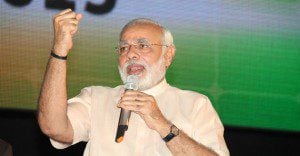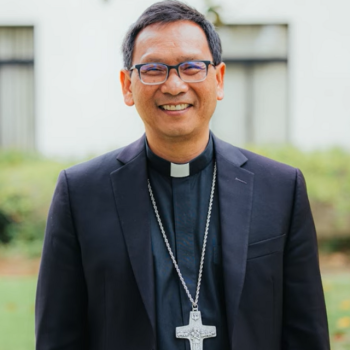
Friday. Christian Persecution
Christians in India took advantage of a visit by the Vatican envoy, Archbishop Richard Gallagher, to implore the Vatican for help in ending the persecution they suffer because they are Christians.
From what I’ve read, the Modi regime gets much of its electoral support because of its Hindu Nationalism. Since Modi took office, the persecution of India’s Christians, including violent persecution, has increased exponentially.
There were 834 cases of violence and hostility against Christians reported in India in 2024, up from 734 in 2023 and from 127 in 2014, when Modi took office. A month ago, 31 Christians were injured in an attack in the Malkangiri district.
Dead bodies of Christians have been dug up for “reconversion ceremonies” and Christians have been prevented from burying their dead in tribal areas of Odisha. Two senior priests in the Sambalpur Diocese — including one in his 90s — were recently brutally attacked, tied up, and threatened with death.
Archbishop Gallagher was in India for what sounds on the surface like a pro-forma visit. According to the Vatican, he was only there for four days, to “strengthen bonds of friendship and collaboration.”
Of course, there is the fact that the Vatican very rarely says anything straight out.
After Archbishop Gallagher met with Subrahmanyam Jaishankar, India’s foreign minister, Jaishankar issued a statement that they discussed “the importance of faith and the need for dialogue and diplomacy to address conflicts.”
That sounds as if the on-going harassment and persecution of India’s Christians may have been discussed in the meeting. But if it was, at least some of India’s Catholic priests did not see it as anywhere near enough.
The persecution of India’s Christians was underscored when the United Christian Forum presented Gallagher with a memorandum that documented the steady rise in anti-Christian violence under the regime of Prime Minister Narendra Modi. The Forum asked the Vatican to intervene on behalf of India’s Christians in the face of the rising incidents of violence and harassment targeting Christians across the country.
Gallagher visited the Jesuit Vidyajyoti seminary in New Delhi, saying Mass and interacting with the theology students. It seems that the seminarians weren’t satisfied with the Vatican’s efforts on behalf of India’s persecuted Christians. One of them labeled Archbishop Gallagher’s visit “Vatican tokenism.”
Jesuit Father Cedric Prakash expressed disappointment over this “Vatican tokenism,” arguing that atrocities against Christians should have been brought up in the discussion with the government.
“Perhaps the all-round silence suits the government,” vocal lay Catholic leader John Dayal, based in New Delhi, told CNA after the envoy’s visit.
The only summary I can give to this is that the Vatican envoy visited an India where Christians are facing increasing persecution from a Hindu Nationalist government. It seems that the Christians in the country were hoping for more support from the visit than they got.
Instead of airy diplomatic statements, they were hoping for direct and public support for their basic human right to practice their faith in peace and without harassment, discrimination and violence.
The Vatican envoy went to India, and that is good. He probably addressed the issue of the persecution of Christians in the Modi regime in a private diplomatic discussion. That is very good.
But he evidently failed to give the Christians in India the assurance that they were heard and supported by the Vatican. They evidently felt let down and maybe even somewhat abandoned by the Church.
It’s a simple fact that hurting people need more than flowery double-speak. When people are afraid for their lives, this kind of opaque language communicates cold indifference, not Christian fellowship.
Gallagher may or may not have been effective in helping India’s Christians through diplomatic means. That will come clear in the weeks and months ahead of us.
But he evidently failed in the ministerial work that was — or should have been — part of his visit. I know that it’s a tough thing to be both a player in world politics and the spiritual leader of billions of hurting people. But that is the role the Church occupies.
The Church fails people on a consistent basis by refusing to simply speak to them in the caring, human voice of one human being communicating with sincerity to another.
The bottom line, always, is that Jesus commissioned Peter by saying “Feed my sheep.” Whatever else priests do, they must always be good shepherds.
From CNA:
Christians in India recently urged the Vatican to respond forcefully to rising violence in the country amid a state visit by Archbishop Paul Richard Gallagher, the Vatican’s secretary for relations with states.
The Vatican said the prelate was visiting the country from July 13–19 to “strengthen bonds of friendship and collaboration.” Besides meeting church officials, Gallagher had an official meeting with Subrahmanyam Jaishankar, India’s foreign minister, on July 17 in New Delhi.
Describing the meeting as a “good conversation,” Jaishankar said in a post on X that the leaders discussed “the importance of faith and the need for dialogue and diplomacy to address conflicts.”
On the same day, a memorandum drafted by the United Christian Forum was presented to Gallagher, one that documented a steady rise in anti-Christian violence under the regime of Prime Minister Narendra Modi, who has headed the pro-Hindu nationalist Bharatiya Janata Party (BJP) government for 11 years.
Note: The Scripture I quoted, “Feed my sheep,” can be found by reading John 21: 15-17.











